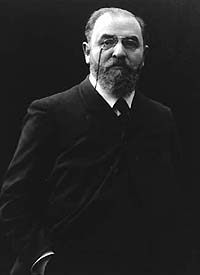Léon Bourgeois
Léon Bourgeois | |
|---|---|
 | |
| Prime Minister of France | |
| In office 1 November 1895 – 29 April 1896 | |
| President | Félix Faure |
| Preceded by | Alexandre Ribot |
| Succeeded by | Jules Méline |
| President of the Senate | |
| In office 14 January 1920 – 22 February 1923 | |
| Preceded by | Antonin Dubost |
| Succeeded by | Gaston Doumergue |
| President of the Chamber of Deputies | |
| In office 10 June 1902 – 12 January 1904 | |
| Preceded by | Paul Deschanel |
| Succeeded by | Henri Brisson |
| Personal details | |
| Born | 21 May 1851 Université de Paris |
Léon Victor Auguste Bourgeois (French: [leɔ̃ buʁʒwa]; 21 May 1851 – 29 September 1925) was a French statesman. His ideas influenced the Radical Party regarding a wide range of issues.
He promoted
Biography
Bourgeois was born in Paris in to a modest Republican family of a watchmaker of Burgundian descent,[2] and was trained in law, graduating from his university in 1874. After holding a subordinate office (1876) in the department of public works, he became successively prefect of the Tarn (1882) and the Haute-Garonne (1885), and then returned to Paris to enter the Ministry of the Interior.
He became Prefect of Police
He retained his office in Émile Loubet's cabinet in 1892, and was Minister of Justice under Alexandre Ribot at the end of that year, when the Panama scandals were making the office one of peculiar difficulty. He energetically pressed the Panama prosecution, so much so that he was accused of having put wrongful pressure on the wife of one of the defendants in order to procure evidence. To meet the charge, he resigned in March 1893 but again took office and retired only with the rest of the Freycinet ministry.
In November 1895, he formed his own cabinet, distinctively radical, which fell as the result of a constitutional crisis arising from the persistent refusal of the Senate to vote supply. He was an eminent Freemason[4][5] and eight of his cabinet members were Freemasons.[6]

The Bourgeois ministry seemed to think that popular opinion would enable them to override what they regarded as an unconstitutional action on the part of the upper house. However, the public was indifferent, and the Senate triumphed. The blow damaged Bourgeois's career as an homme de gouvernement. As Minister of Public Instruction in the Brisson cabinet of 1898, he organized courses for adults in primary education. After the short ministry, he represented his country with dignity and effect at the Hague Peace Convention, and in 1903 was nominated a member of the permanent court of arbitration.
He held somewhat aloof from the political struggles of the
Following World War I, he became President of the Council of the League of Nations and won the Nobel Peace Prize for his work in 1920.
A social republican, Bourgeois sought a middle ground between socialism and capitalism which he termed "solidarism". He believed that the rich had a social debt to the poor which they should pay by the income tax, thus providing the state with the necessary revenue to finance social measures for those living in poverty. However, the Senate opposed his proposal, and opposition grew until his resignation as prime minister.
Bourgeois's Ministry, 1 November 1895 – 29 April 1896
- Léon Bourgeois – President of the Council and Minister of the Interior
- Marcellin Berthelot – Minister of Foreign Affairs
- Godefroy Cavaignac– Minister of War
- Paul Doumer – Minister of Finance
- Louis Ricard – Minister of Justice
- Édouard Locroy– Minister of Marine
- Émile Combes – Minister of Public Instruction, Fine Arts, and Worship
- Albert Viger – Minister of Agriculture
- Pierre-Paul Guieysse – Minister of Colonies
- Edmond Guyot-Dessaigne – Minister of Public Works
- Gustave Mesureur – Minister of Commerce, Industry, Posts, and Telegraphs
Changes
- 28 March 1896 – Bourgeois succeeds Berthelot as Minister of Foreign Affairs. Ferdinand Sarrien succeeds Bourgeois as Minister of the Interior.
Support to the French National Museum of Natural History
Bourgeois is one of the founders of the Friends of the Natural History Museum Paris society. He was the very first president in office from 1907 to 1922.[8]
References
- ^ J. E. S. Hayward, "The Official Philosophy of the French Third Republic: Leon Bourgeois and Solidarism," International Review of Social History, (1961) 6#1 pp 19-48
- ^ "The Nobel Peace Prize 1920". NobelPrize.org. Retrieved 16 November 2022.
- ISSN 0002-9300.
- ISBN 9780754671558.
- ^ He was initiated at "La Sincerité", lodge of Grand Orient de France (Paul Guillaume, « La Franc-maçonnerie à Reims (1740–2000) », 2001, p. 333)
- ISBN 9780521358576.
- ISBN 0-8133-0678-7p.92
- ^ Yves Laissus, "Cent ans d'histoire", 1907-2007 - Les Amis du Muséum, centennial special, September 2007, supplement to the quarterly publication Les Amis du Muséum national d'histoire naturelle, n° 230, June 2007, ISSN 1161-9104 (in French).
- France since 1870: Culture, Politics and Society by Charles Sowerine.
This article incorporates text from a publication now in the public domain: Chisholm, Hugh, ed. (1911). "Bourgeois, Léon Victor Auguste". Encyclopædia Britannica (11th ed.). Cambridge University Press.
External links
- Léon Bourgeois on Nobelprize.org including the communication with the Nobel Committee, December, 1922 The Reasons for the League of Nations
- About Leon Victor Auguste Bourgeois on nobel-winners.com
- Works by or about Léon Bourgeois at Internet Archive
- Newspaper clippings about Léon Bourgeois in the 20th Century Press Archives of the ZBW
